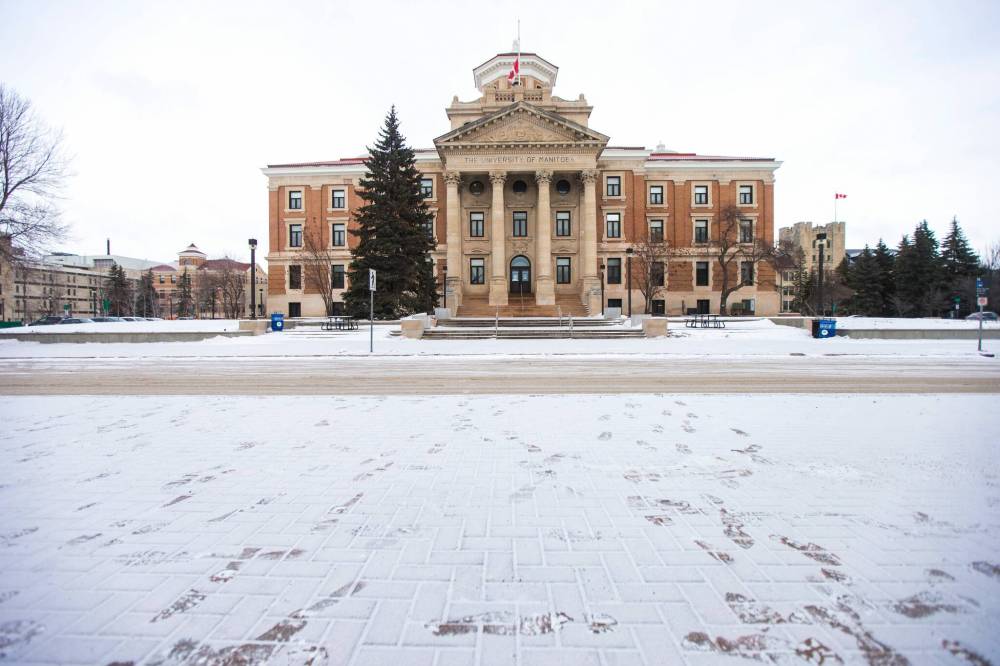U of M program puts media literacy in spotlight
Advertisement
Read this article for free:
or
Already have an account? Log in here »
To continue reading, please subscribe:
Monthly Digital Subscription
$0 for the first 4 weeks*
- Enjoy unlimited reading on winnipegfreepress.com
- Read the E-Edition, our digital replica newspaper
- Access News Break, our award-winning app
- Play interactive puzzles
*No charge for 4 weeks then price increases to the regular rate of $19.95 plus GST every four weeks. Offer available to new and qualified returning subscribers only. Cancel any time.
Monthly Digital Subscription
$4.99/week*
- Enjoy unlimited reading on winnipegfreepress.com
- Read the E-Edition, our digital replica newspaper
- Access News Break, our award-winning app
- Play interactive puzzles
*Billed as $19.95 plus GST every four weeks. Cancel any time.
To continue reading, please subscribe:
Add Free Press access to your Brandon Sun subscription for only an additional
$1 for the first 4 weeks*
*Your next subscription payment will increase by $1.00 and you will be charged $16.99 plus GST for four weeks. After four weeks, your payment will increase to $23.99 plus GST every four weeks.
Read unlimited articles for free today:
or
Already have an account? Log in here »
Hey there, time traveller!
This article was published 28/03/2023 (1018 days ago), so information in it may no longer be current.
A new University of Manitoba program aims to arm its students with journalistic techniques and critical-thinking skills in an effort to improve media literacy.
“In one way or another, everybody consumes media. Therefore, I think it’s important everybody understands how to read it; how they can be misled if they are not careful, how to identify misinformation and how to source information,” said Cecil Rosner, who will teach the media literacy, critical thinking and investigative journalism program.
Rosner is an investigative journalist with more than 30 years of experience, including managing CBC Manitoba’s newsroom and executive producer at The Fifth Estate.

MIKAELA MACKENZIE / WINNIPEG FREE PRESS FILES
A new University of Manitoba program aims to arm its students with journalistic techniques and critical-thinking skills in an effort to improve media literacy.
Speaking by phone Tuesday, Rosner highlighted the many benefits of media literacy.
“Journalists think about this topic all the time, but I am not sure how overtly ordinary people think about it,” Rosner said. “Some people think there’s a bit of a mystery to (journalism) and I want to dispel that myth… There are tools and techniques you need to know about but they are very teachable.”
The program is divided into three courses, which cover the tenets of journalism and critical thinking, understanding public records, and investigative journalism techniques.
Students will learn to asses the validity of news, consider cognitive biases, utilize public records and assemble background profiles on people and organizations.
Brent Jolly, president of the Canadian Association of Journalists, called media literacy a way to “build a stronger and more resilient citizenry.”
“People have started to believe the rhetoric online about journalists being enemies or mouthpieces of the government,” Jolly said by phone. “Any tools we can use to help the public better understand how journalism works is a great contribution.”
Rosner is a CAJ vice-president. Both men said they would like to see the concepts of media literacy introduced at every level of education.
The university is offering the program through its extended education division, and students will not receive an academic credit for completing it.
The curriculum has been in development for more than a year, Rosner said.
Each section is two weeks long, and classes are delivered online. Students will be required to attend one live, online session per week on Monday evenings. Classes begin May 8 and end June 16.
tyler.searle@freepress.mb.ca

Tyler Searle is a multimedia producer who writes for the Free Press’s city desk. A graduate of Red River College Polytechnic’s creative communications program, he wrote for the Stonewall Teulon Tribune, Selkirk Record and Express Weekly News before joining the paper in 2022. Read more about Tyler.
Every piece of reporting Tyler produces is reviewed by an editing team before it is posted online or published in print — part of the Free Press‘s tradition, since 1872, of producing reliable independent journalism. Read more about Free Press’s history and mandate, and learn how our newsroom operates.
Our newsroom depends on a growing audience of readers to power our journalism. If you are not a paid reader, please consider becoming a subscriber.
Our newsroom depends on its audience of readers to power our journalism. Thank you for your support.
History
Updated on Tuesday, March 28, 2023 8:08 PM CDT: Fixes typo

